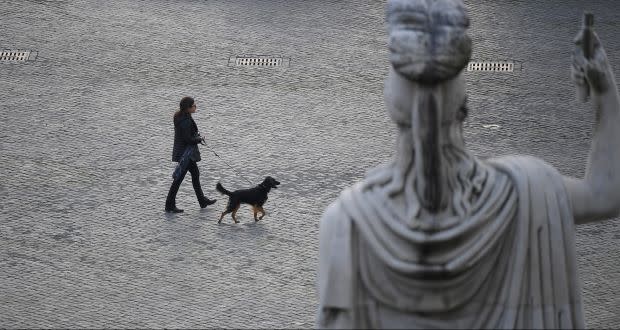More than 100,000 people have been caught defying Italy’s lockdown

Italy’s already-stringent rules are now even more restrictive. Grocery stores, pharmacies, postal offices, and banks remain open, while everything else must close for two weeks, starting from Wednesday (March 24). Movement between cities for reasons other than work and health is forbidden.
It’s yet another attempt to stop a virus that has so far infected almost 64,000 people here, and killed more people than in any other country in the world. Giuseppe Conte, the prime minister, told Italian newspaper Stampa that everyone’s efforts are needed: “The survival of the social and economic fabric of our country is at stake.”
Italy’s 60 million citizens can only leave their houses for a handful of reasons—to go to the supermarket or the pharmacy, for instance—and need to carry a document stating why they are outside, where they are coming from, and where they are going. If caught breaking the rules, they can be fined about €200 ($215).
Slower spread
Instead of the more gradualist approach implemented by the US and, until Monday (March 23), by the UK, Italy has copied China, imposing strict limits on movement and gatherings as soon as cases started to spike. Both lines of action have been criticized, either for being too lax or too severe.
This weekend, Italy saw some early signs that its approach is working. The number of new infections and fatalities dropped on Sunday (March 22), and again on Monday, indicating that even if numbers are still growing, it is at a slower pace than before.
Experts are cautious. Silvio Brusaferro, the head of the national health institute, told Reuters that it’s still too early to say if cases will continue to drop, and that the current retreat might be a consequence of less testing. Authorities don’t want to celebrate too early and send a message to the population that things are fine. People still need to stay inside.
Rule breakers
Most Italians are respecting the drastic containment measures. Many are now entering their second or third week of complete isolation, leaving their homes only to buy food. But Attilio Fontana, the governor of Lombardia, the worst-hit region, told Italian newspaper Corriere that he’s still seeing too many people outside. “On one hand, I see people going out for strolls, on the other, I see people who can’t breathe anymore.”
Over the past two weeks, authorities have caught more than 100,000 people outside for no good reason, or lying on their forms. On Tuesday (March 24), the government debated increasing the fines to between €500 and €4,000 ($540 and $4300).
Public and official anger towards rule breakers is growing. In Turin, some are photographing or harassing people on sidewalks from their balconies—ignoring the fact that some might work in grocery stores and pharmacies.
Mayors are personally intervening, scolding people they catch outside, and recording it for the internet to see. Governors are livestreaming angry sermons. “I’m getting word that someone is having a graduation party,” said Campania chief Vincenzo De Luca. “We’ll send in the police. We’ll send them in with a flamethrower.”
Sign up for the Quartz Daily Brief, our free daily newsletter with the world’s most important and interesting news.
More stories from Quartz:
A diarist who chronicled life in Wuhan during the coronavirus lockdown has penned her final entry
Social distancing from house helps is exposing the Indian family’s unspoken sexism